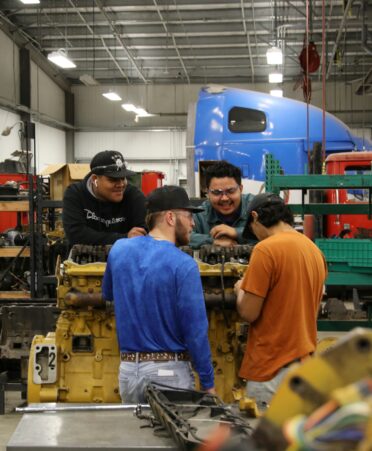(ROSENBERG, Texas) – With nearly 300,000 bus and truck mechanics and diesel engine specialists at work in the U.S., jobs in the diesel equipment industry can provide long-lasting, and profitable, careers.
But with such a large market come changes, and sometimes changes can forever shape the way an industry moves forward. The latest of these is the transition to electric vehicles.
Many major trucking and diesel companies such as FedEx and Amazon are committed to going fully electric by 2040. Companies are looking at benefits in cost, better safety for drivers and better sustainability for the environment.
Jose Reyna, an instructor for the Diesel Equipment Technology program at Texas State Technical College’s Fort Bend County campus, sees the shift to electric as a “when,” not an “if.” Still, many of the problems that diesel technicians solve today would remain the same, he predicted.
“The differences between automobiles and heavy trucks would remain the same as they are now,” Reyna said. “Those differences are braking and long-haul. Heavy trucks require a substantial amount of braking force to slow down the heavy giant, as well as extra battery power for the required long interstate corridor runs across the country.”
TSTC is aware of the changes that the industry is facing over the coming years. As a result, instructors like Reyna have been sent to various EV safety standard seminars presented by groups such as the National Institute for Automotive Service Excellence. This allows them to keep active and in the know about current trends.
Reyna described how, moving forward, one of the biggest challenges that diesel equipment programs will face is obtaining EV trucks to work hands-on with.
“In my opinion, one of the biggest challenges we face is the high-voltage, hands-on training we would require students to learn,” Reyna said. “As traditional mechanics, we have been taught on 12 volt to 48 volt systems, not high voltage. Whereas currently working with high fuel pressures (25,000-30,000 psi) has been one of our biggest areas to tread on, high voltage will be the one coming up to bat.”
Even so, change is not new for the industry, and Reyna believes that he and the other program instructors will be able to overcome any challenges that accompany the transition to electric.
“In the past, lowering emissions was one of the diesel industry’s newest ‘innovations,’” Reyna said. “Swift actions were required to adjust, adapt and conquer this highly desired action. The diesel industry executed this emissions ‘movement’ as if it were no big deal, and hopefully the diesel industry can implement this same mindset for EV.”
Diesel Equipment Technology is available at TSTC’s Fort Bend County, Marshall, North Texas, Sweetwater and Waco campuses. Depending on campus location, the program offers Associate of Applied Science degrees with different specializations, as well as several certificates of completion.
The program is one of nine Money-Back Guarantee programs in which tuition is refunded if the participating graduate has not found employment in their field of study within six months of graduation. For more information about the guarantee, visit tstc.edu/mbg.
According to onetonline.org, bus and truck mechanics and diesel engine specialists in Texas can earn a median salary of $50,970 a year. The website projected that there would be a 19% increase in the number of such jobs in the state from 2020 to 2030.
Registration for TSTC’s fall semester is underway. For more information, go to tstc.edu.
